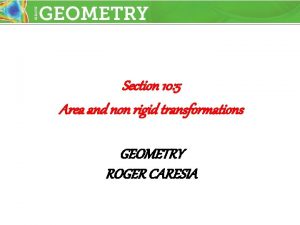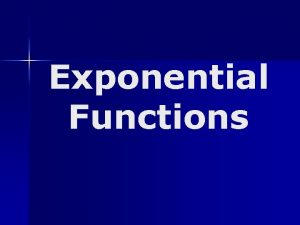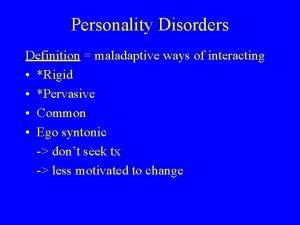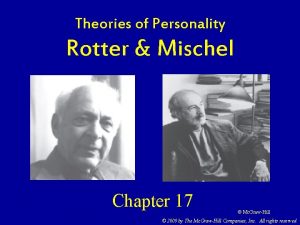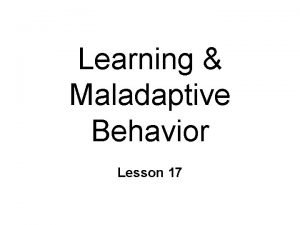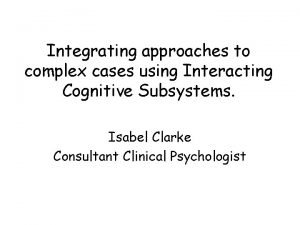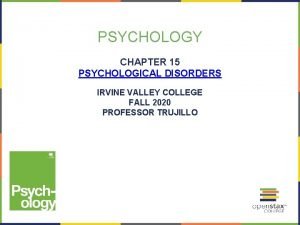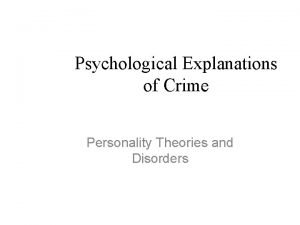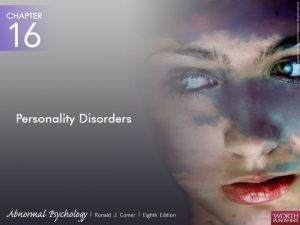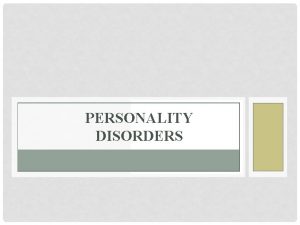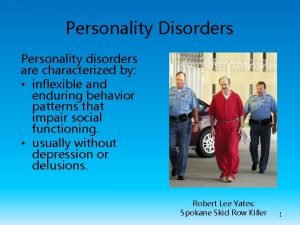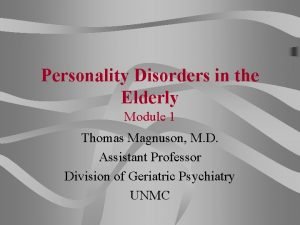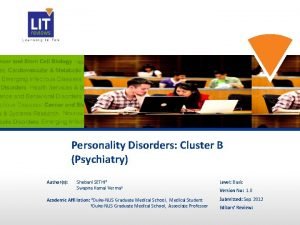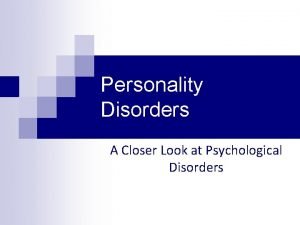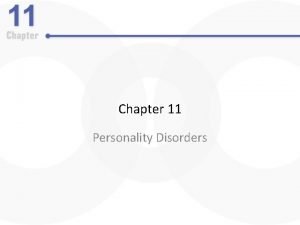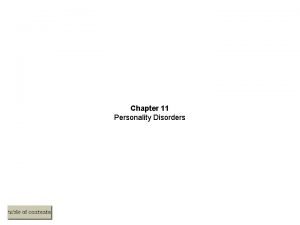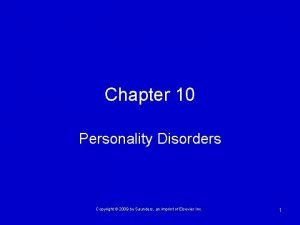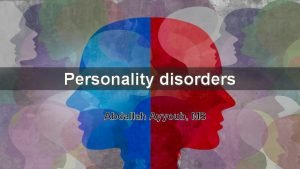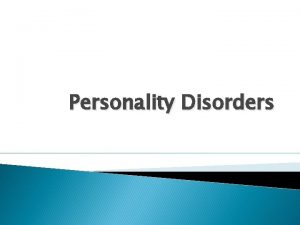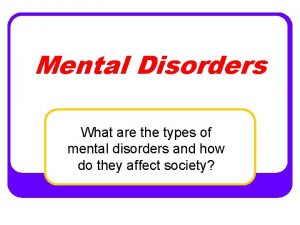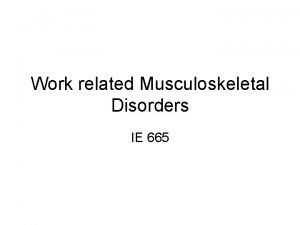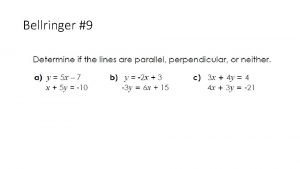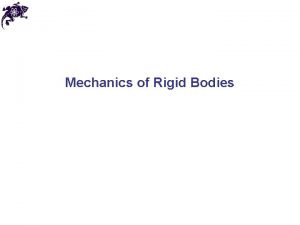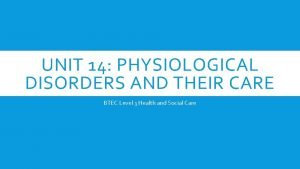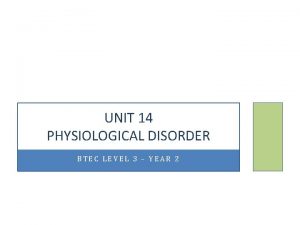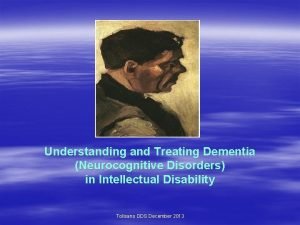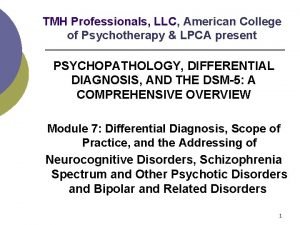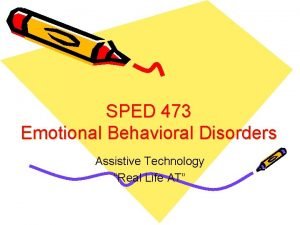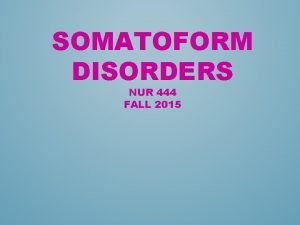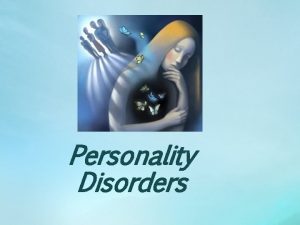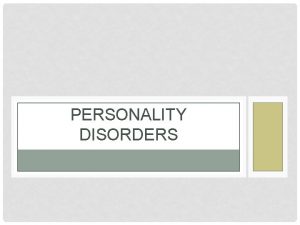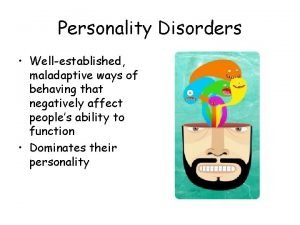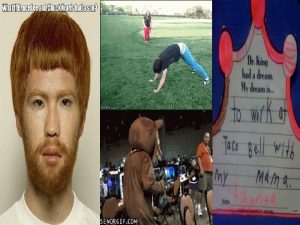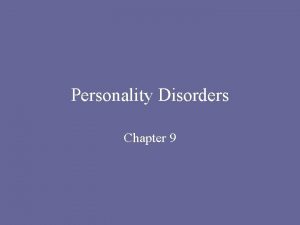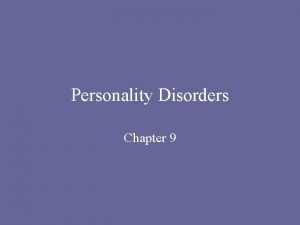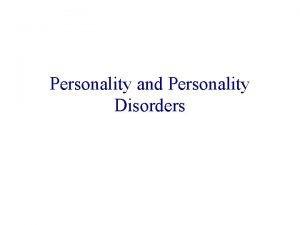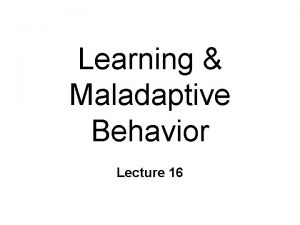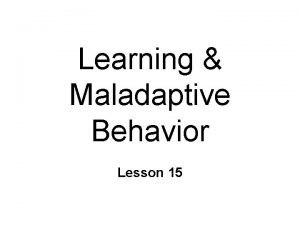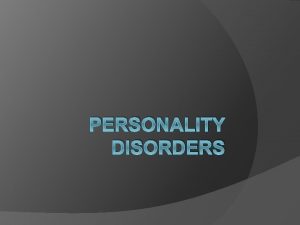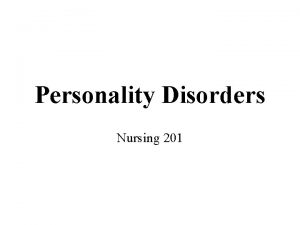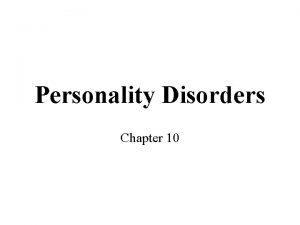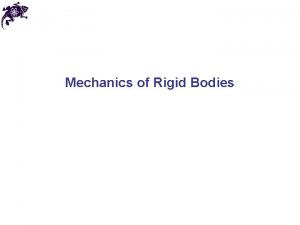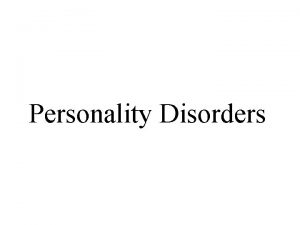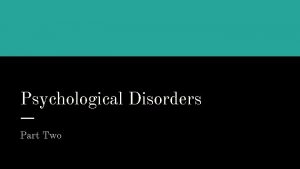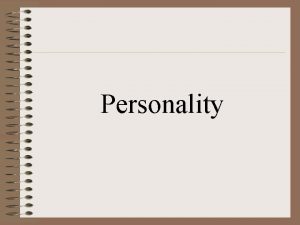Personality Disorders Definition maladaptive ways of interacting Rigid






































- Slides: 38

Personality Disorders Definition = maladaptive ways of interacting • *Rigid • *Pervasive • Common • Ego syntonic -> don’t seek tx -> less motivated to change

“Medical Students’ Disease” • Continuum of characteristics • Disorder = greater degree & impairment Course • Originate in childhood & persists

Sex Differences 1. Histrionic, dependent = women 2. Current research: Either > in males or equal • Males = Paranoid, Schizotypal, Antisocial, Narcissistic, Obsessivecompulsive • Equal = Histrionic, Avoidant, Dependent • Females = Borderline

Sex Bias: Ford & Widiger • Histrionic/Antisocial case histories: male diagnosed Antisocial PD female diagnosed Histrionic PD • Simple gender differences …bias • But Histrionic PD may brand stereotypic women as mentally ill

• Categories vs. Dimensions – Currently, categories – Possible move to dimensions – Reduces stigma – Reflects actual clients

Cluster A: Odd, eccentric Paranoid PD = Excessively suspicious/mistrustful Causes • Slight genetic evidence of link to schizophrenia • Cognitive errors • Parental teaching • Certain groups more susceptible

Treatment • Only seek for crisis • Therapist provides trust (cognitive therapy for errors) • No clear evidence of change

Schizoid PD • Solitary, uninterested in others • Not from fear • But some are sensitive • Extreme social deficiencies • No unusual/bizarre thoughts

Causes - unknown • Isolation resembles autism -> maybe shared biological mechanism Treatment • Help develop interest in relationships • Little optimism

Schizotypal PD • Social isolation + unusual behaviors & thoughts • Not full-blown hallucinations, but “as if”

Causes - little known • Genetic link to schizophrenia • Probable environmental stressors Treatment • Social skills to improve relationships • Help adjust to solitary life • Antipsychotics (but side effects)

Cluster B: Dramatic, emotional Antisocial PD • Disregard for social norms • No remorse • Substance abuse/sensation-seeking • Age 18

Causes a) Genetic influence on nonviolent criminality b) Neurobiology: NOT brain damage i. Low cortical arousal - stimulation-seeking behaviors - slower brain waves/heart rate ii. Fearlessness hypothesis - higher threshold for fear & worse at detecting danger cues iii. Inhibition vs. reward systems: weak inhibition & strong reward (BAS vs. BIS)

c) Aggression learned at home - parents reward kid’s aggression - inconsistent discipline - low SES

Treatment • Behavior dies down by age 40 • But difficult to treat • Manipulate therapist • Few positive outcomes • Focus: childhood prevention via parent training

Borderline PD *No sense of self • Instability in relationships -> fear abandonment • All-or-none thinking • Unstable moods • Poor self-image (“empty”) • Impulsive

Causes • Possible genetics – mood disorders • Childhood trauma • Psychodynamic: Abandonment fears poor separation/individuation from mom

Treatment • Extremely difficult • But: Linehan — help dev. identity • Support/constancy, coping, identify & regulate emotions • Medication (for depression & anxiety) - poor compliance, abuse meds

Histrionic PD • Dramatic, self-centered, shallow • Singers, actors

Causes • Learn appearance & performance -> attention

Treatment • Focus on problematic relationships • Reward for appropriate & fine for inappropriate/attention-getting behavior

Narcissistic PD • Grandiose, exaggerated sense of own importance • Preoccupation with gaining attention • Lack sensitivity/compassion, exploit others

Causes • Inadequate admiration from parents • Damaged sense of self • Grandiosity = façade • Current society (“me, ” instant gratification) -> increases prevalence

Treatment: Cognitive i. Replace grandiose fantasies - attainable daily pleasures ii. Coping with criticism iii. Understand others’ feelings iv. Treat depression

Cluster C: Anxious, fearful Avoidant PD • Extreme sensitivity to rejection • Actively avoid relationships • Low opinion of self

Causes • May be more “difficult” infants -> inadequate early unconditional positive regard -> alienated & unworthy

Treatment - many good studies • Behavioral therapy for anxiety & social skills problems • Systematic desensitization for specific situations

Dependent PD • Excessive reliance on others for everyday decisions • Abandonment fears • Submissive/agreeable to avoid rejection

Causes • Childhood assertiveness punished • Parental overprotection • Early parental loss/rejection -> abandonment fears

Treatment - little research • Appear to be ideal therapy clients -> danger of over-dependence on therapist • Develop independence & responsibility

Obsessive-Compulsive PD • Preoccupation with the “right way” • Inflexible, perfectionistic, rigid • Relationships often poor • Only distantly related to OCD

Causes • Possible genetic basis, but weak • Strong parental discipline & over-control • No real understanding of causes

Treatment - little research • Attack fears underlying perfectionism • Deal with possible anxiety regarding inadequacy • Relaxation/distraction

For all PDs, therapy involves • Insight into how they affect other people & are perceived • Insight into how their behavior causes them problems

Ethical Issues Therapy with Personality Disorders • Very resistant to treatment • Rarely seek treatment on own -> When is treatment justifiable?

Adopting a Potential Sociopath • Strong genetic basis for APD/sociopathy => Should adoptive parents be told if child is offspring of sociopath? => Is revealing this information to prospective parents fair to the child?

Interpersonal Psychotherapy Rationale • General style of interacting • Most are flexible • In people with personality disorders, style is rigid & pervasive • Goal of interpersonal psychotherapy = help people be more flexible

Therapy • Pull from usual part of circle to opposite • Act in complementary manner to goal behavior • Meta-communicate
 10-5 area and nonrigid transformations
10-5 area and nonrigid transformations Overflow dam and non overflow dam
Overflow dam and non overflow dam Irrational function graph
Irrational function graph Rigid personality definition
Rigid personality definition Cognitive affective personality system
Cognitive affective personality system Learned maladaptive behavior
Learned maladaptive behavior Metes and bounds aphg
Metes and bounds aphg Interacting with coworkers
Interacting with coworkers Interacting molecules or ions
Interacting molecules or ions Interacting cognitive subsystems
Interacting cognitive subsystems Diathesis stress model
Diathesis stress model Cluster b
Cluster b Avoidant personality disorder
Avoidant personality disorder Personality disorders dsm 5
Personality disorders dsm 5 Psychological disorders characterized by inflexible
Psychological disorders characterized by inflexible Cluster c personality disorder
Cluster c personality disorder Cluster traits
Cluster traits Schizotypal personality disorder
Schizotypal personality disorder Antisocial personality disorder ελληνικα
Antisocial personality disorder ελληνικα Cluster c personality disorders
Cluster c personality disorders Cluster b personality disorders
Cluster b personality disorders Cluster b personality disorders
Cluster b personality disorders Weird wild wacky personality disorders
Weird wild wacky personality disorders Type c personality disorder
Type c personality disorder Cluster c personality disorders
Cluster c personality disorders Romans 3:10
Romans 3:10 Work related musculoskeletal disorders definition
Work related musculoskeletal disorders definition Rigid body transformation in computer graphics
Rigid body transformation in computer graphics Rigid rotator definition
Rigid rotator definition Rigid motion definition
Rigid motion definition What is a rigid body
What is a rigid body Unit 14 health and social care
Unit 14 health and social care Unit 14 task 1
Unit 14 task 1 Neurocognitive disorder
Neurocognitive disorder Bipolar and other related disorders
Bipolar and other related disorders Bipolar and other related disorders
Bipolar and other related disorders Flinders model of care
Flinders model of care Assistive technology for behavior
Assistive technology for behavior Nursing diagnosis of somatoform disorder
Nursing diagnosis of somatoform disorder
